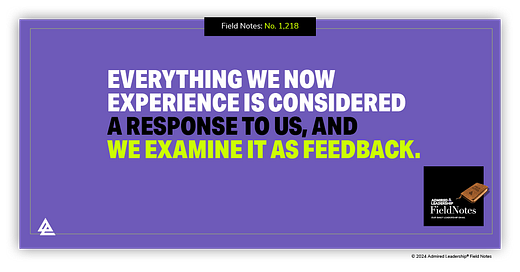Leaders and performers who are highly committed to self-improvement and making big strides in development see everything as feedback.
From this vantage point, information about the person, the performance, and the moment flows from every conceivable direction. The world and its response to our performance are a never-ending source of evaluation and suggestion.
Not surprisingly, those who choose to see everything as feedback learn more about themselves and learn more specific items to change compared to others.
Viewing everything as feedback widens the lens of how we see the world and what it is saying to us. We begin to reinterpret information that was previously perceived as mundane, irrelevant, or unconnected to us directly.
Instead, we now view what we experience as saying something meaningful about who we are and how we are performing. The list of information that becomes data for consideration still depends on the traditional sources of feedback: failures, successes, advice, criticism, recommendations, suggestions, and praise.
But we can now add to this list many more sources of insight, including questions we are asked, reactions we receive, gestures of others in our presence, who avoids or moves away from us, who wants our time or moves toward us, indirect comments about our performance, what details others focus on, major and minor challenges or resistance we face, the emotions we encounter and how they change in our presence, and the compliments or flattery others offer us, among numerous other sources.
Everything we now experience is considered a response to us, and we examine it as feedback.
To operate in this way, a leader’s general awareness and observational skills are essential tools. Becoming attuned to what others don’t see or consider is central to this mindset.
So-called minor reactions, responses, comebacks, answers, retorts, and replies become full of meaning and insights. Suddenly, the tone, inflection, and accents others employ become critically important to our learning.
Staying fully attuned to everything as feedback can be exhausting. Very few leaders or performers can do it as an ongoing learning style.
More sensible is the idea of trying to adopt this mindset for a full day every now and then. Opening the aperture of what counts as feedback can be transformative even if only deployed for a short duration, like an hour, a meeting, or a day.
Seeing everything as feedback makes us more aware, and awareness is always the greatest agent for meaningful change.





It was wise to acknowledge how tiring this approach can be. :-) Imagine maintaining high levels of concentration throughout a competitive match. How useful is this skill, however?
"The art of observation is a very fine thing. It is worthwhile to carry it along with one, for it enables one to notice things that may escape those who do not practice it." - Sherlock Holmes, in "A Scandal in Bohemia" (Sir Arthur Conan Doyle) I would add this observation by Georg Wilhelm Friedrich Hegel, "Observation is the foundation of all intellectual activity."
While here, why not throw in Sun Tzu, "The general who wins the battle makes many calculations in his temple ere the battle is fought. The general who loses makes but few calculations beforehand."
Taking time to slow down and see is an underrated skill in all spheres of our existence. How much more for a leader?
Every interaction is an opportunity to make someone better.